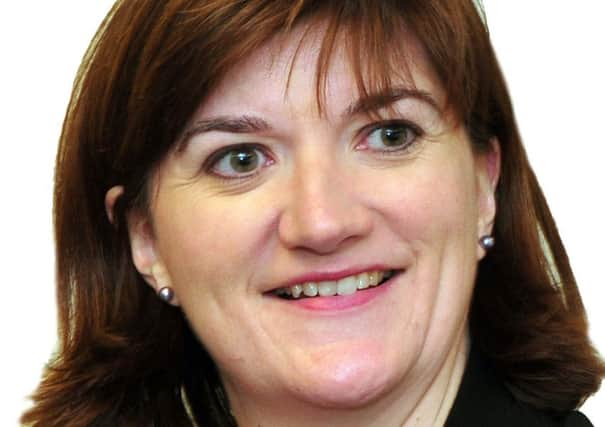Women's Minister Nicky Morgan: Working solution is in sight if we keep on breaking down barriers


If we want to create a culture where everyone has the opportunity to fulfil their potential, we must ensure that our young people see diversity in senior positions – whether leading our businesses, heading up our schools, or in government positions.
We have more women in work than ever before, more female-led businesses and the lowest gender pay-gap on record. In Yorkshire, the gender pay-gap has fallen to 19.4 per cent since 2010, in line with the UK average. In fact, for women working full-time under 40 it has been almost eliminated. But I’m determined that we progress faster – that’s why we’re committed to closing the pay-gap in a generation.
Advertisement
Hide AdAdvertisement
Hide AdThis isn’t just about tackling inequality, it makes good business sense. McKinsey estimates that the UK could add £600bn of additional annual GDP by 2025 through bridging the gap. That’s why we’re forcing companies with over 250 employees to publish their gender pay-gap, including bonus information, and we’ll also be publishing a league table by sector by 2018 – not only to shine a light on where it’s worst, but also to showcase those leading the way.
The response from businesses has been overwhelmingly positive, with many already engaged on this agenda. One is Virgin Trains East Coast, based in York, which is involved in the Government’s Think, Act, Report initiative. It’s an excellent example of what is possible when you think outside the box – engaging directly with employees, through surveys and focus groups, empowering them to break down the potential barriers at work.
We know we also need to tackle the root causes of the pay-gap – starting in the classroom. In Yorkshire there are now over 133,000 more children in Good or Outstanding schools than in 2010, thanks to our reforms. But just 24 per cent of girls’ A level entries are currently in maths and sciences, compared with almost four in 10 boys – which is why we’re taking action. Girls should be taking subjects in school that will propel them into the highest-paid careers and sectors where their skills are needed most.
Research shows that those in science or technological careers are paid, on average, 19 per cent more – and there are a predicted 257,000 jobs in engineering that need filling between now and 2022. That’s why we have a bold new ambition to see 15,000 girls entering maths and sciences A levels by 2020, helping them to get into these industries, building a workforce for the future.
Advertisement
Hide AdAdvertisement
Hide AdThere’s no such thing as a “man’s job”. We need to shut down these myths and ensure girls in our schools are looking to more diverse role models – people like Roma Agrawal, who built The Shard in London.
But it isn’t just gender equality that needs our focus. Everyone, no matter their gender, sexual orientation or race, should be able to fulfil their potential, so we are taking steps to tackle the causes of inequality right where they start – such as increasing support for disabled children, and improving access to higher education for black and minority ethnic (BME) applicants.
We are tackling the prejudices of homophobia, biphobia and transphobia, providing £2m to support anti-bullying projects in schools, ensuring that our young people are proud to uphold British values of tolerance and respect; and proud to live in a country where diversity is one of our greatest advantages.
As part of this, I am particularly delighted to have funded Barnardo’s in Yorkshire, which is working hard on this agenda, training teachers, school staff and young people in Leeds, Wakefield and Calderdale.
Advertisement
Hide AdAdvertisement
Hide AdFor me, the message couldn’t be simpler: we live in a diverse world and working together to see everyone fulfil their potential is not just the right thing to do – but also the right thing for our country.